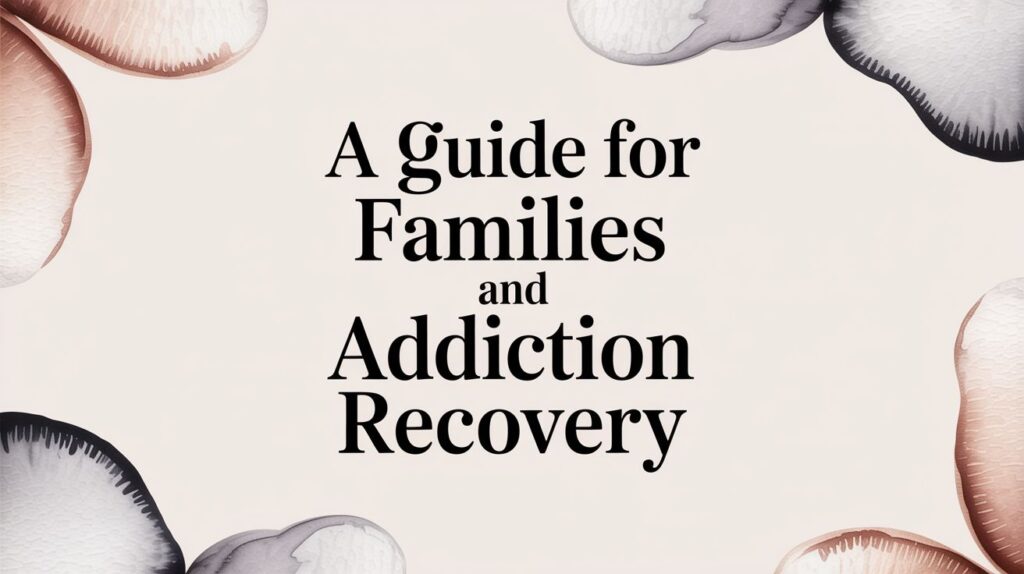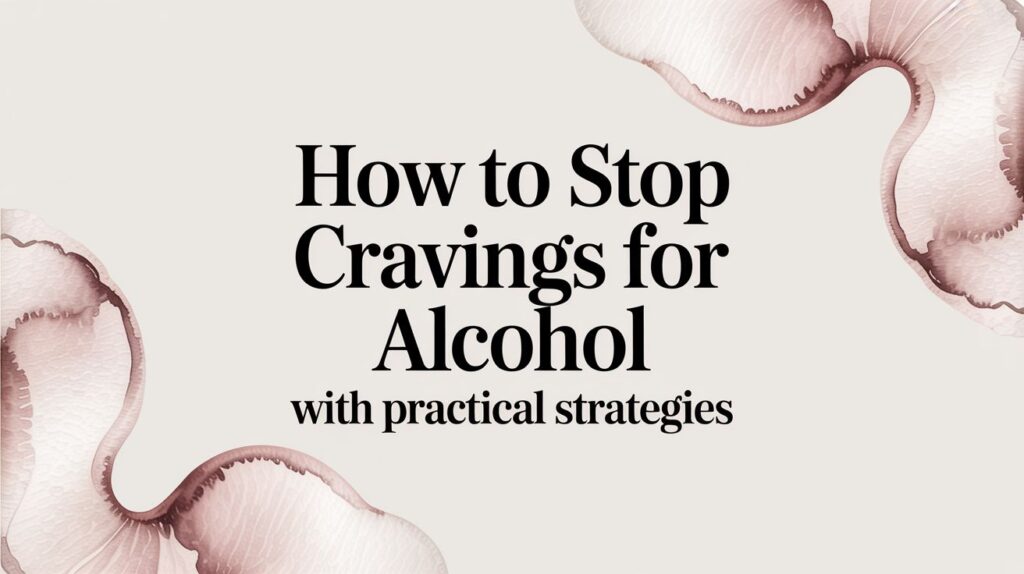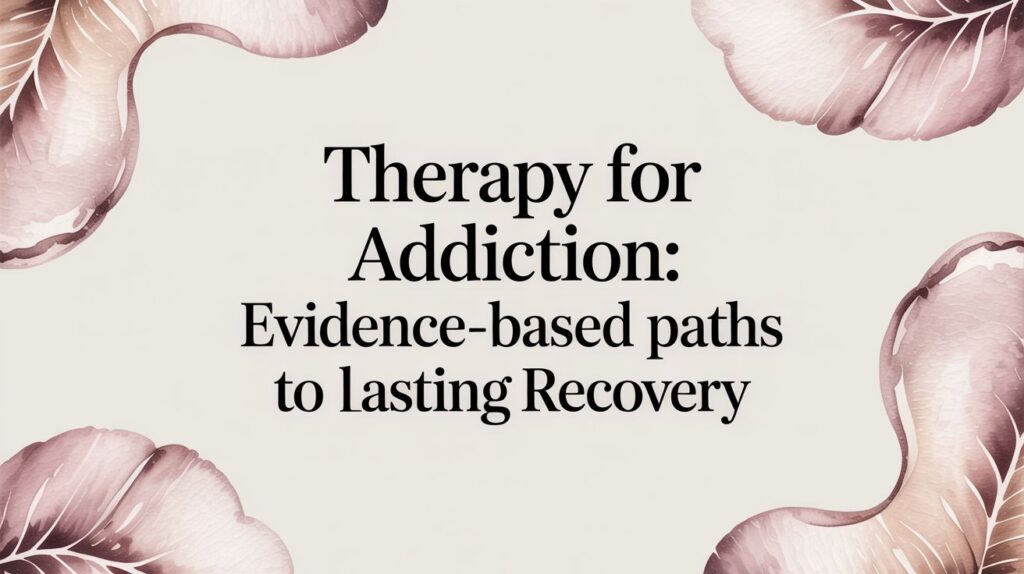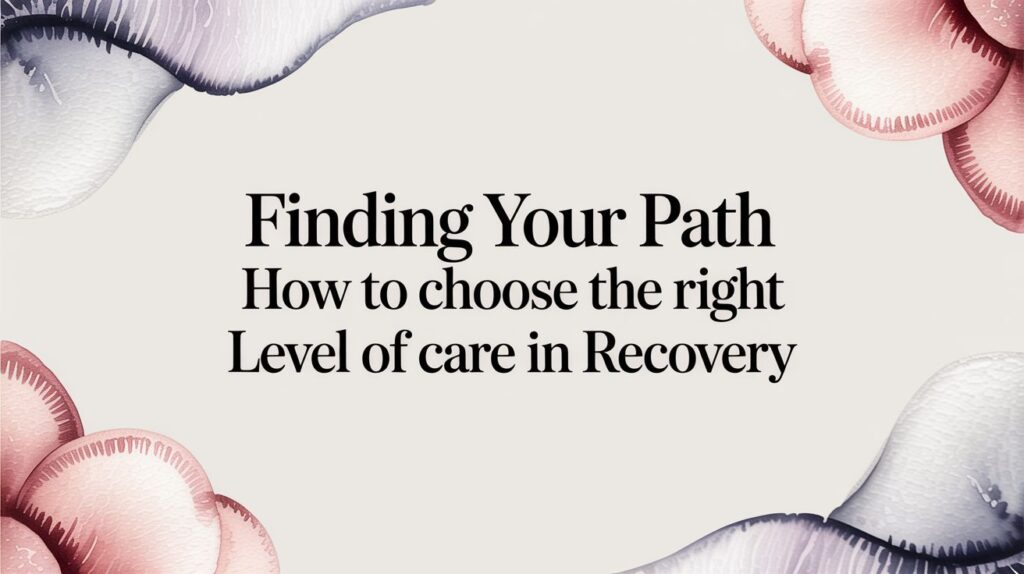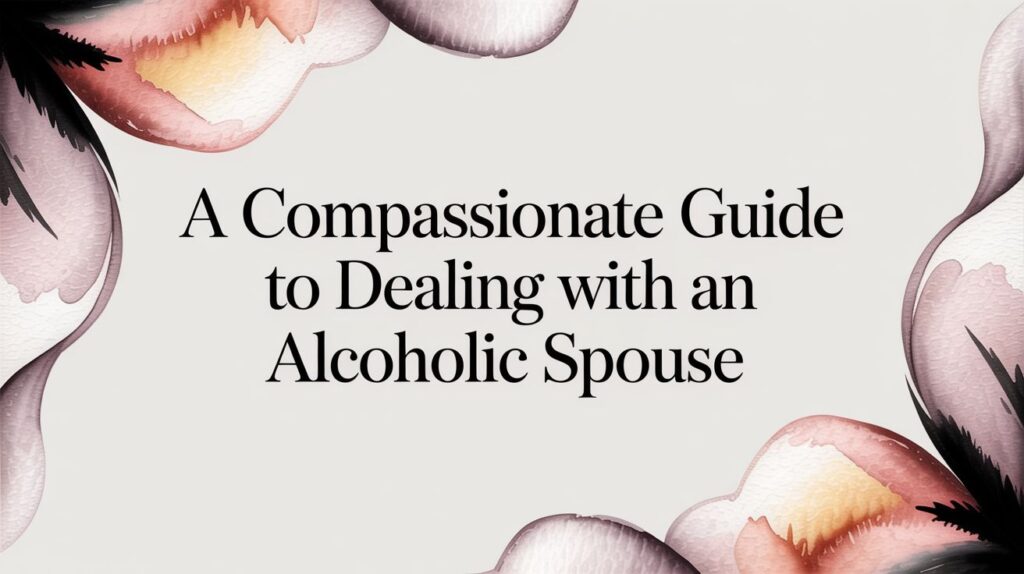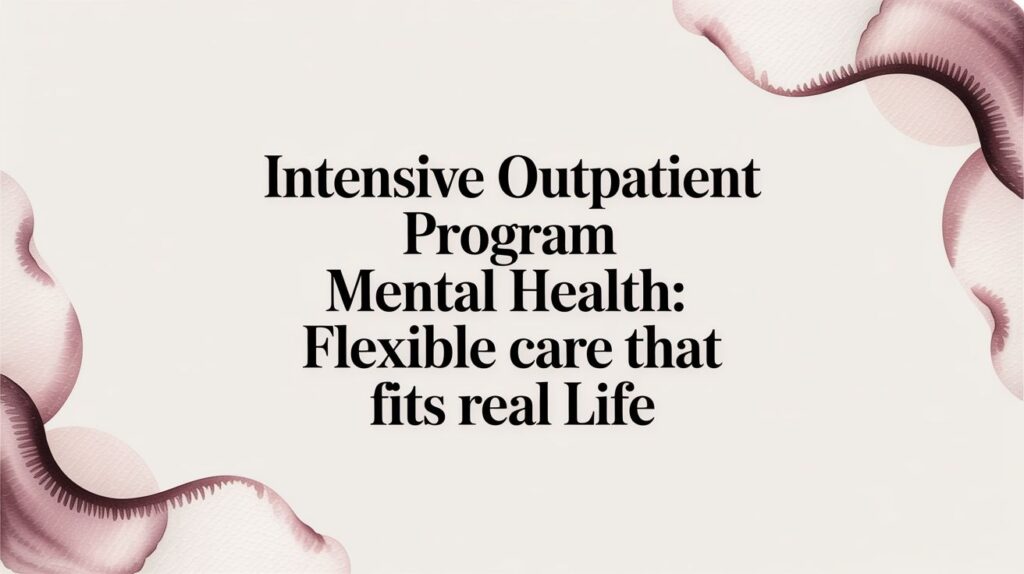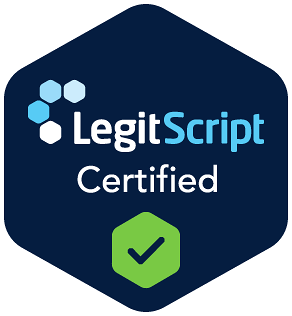When addiction takes root in a family, it’s never a solo journey. It’s a force that quietly but completely rewires relationships, hijacks communication, and turns daily life upside down. For every person struggling, there's a network of loved ones caught in the fallout, navigating an environment thick with chaos, mistrust, and anxiety.
How Addiction Reshapes the Family Landscape
Think of substance use as an unwelcome guest who moves in and never leaves. At first, the changes are small, but over time, this guest starts rearranging the furniture until the whole house feels foreign and unsafe. It doesn't just impact the person using; it sends tremors through the entire family, cracking the very foundation of trust and routine.
The numbers are staggering. In the past year alone, 48.5 million people in the U.S. had a substance use disorder, according to insights from addictiongroup.org. Each of those numbers represents a family grappling with the consequences.
Often, the first casualty is honest communication. Conversations become minefields of unspoken tension and careful avoidance. Family members start "walking on eggshells," terrified of saying the wrong thing and triggering a conflict or another round of substance use. This slow, painful breakdown in connection is one of the earliest and most devastating effects addiction has on a family.
The Emotional Toll on Loved Ones
Living alongside addiction is emotionally draining. The constant rollercoaster of worry, hope, and crushing disappointment creates a high-stress environment where the mental health of family members often suffers. It's an exhausting way to live.
Commonly, loved ones find themselves battling:
- Pervasive Anxiety: A relentless worry about your loved one’s safety, their health, and what the future holds.
- Feelings of Guilt: A nagging belief that you're somehow to blame or that you should have done more to stop it.
- Deep-Seated Anger: Frustration aimed at your loved one for their choices, and at the addiction itself for its destructive power.
- Erosion of Trust: A constant barrage of broken promises and lies makes it nearly impossible to maintain the trust that healthy relationships are built on. You can learn more about how addiction impacts recovery and relationships in our detailed guide.
Addiction doesn’t just steal a person; it steals a family's sense of security, predictability, and peace. Life begins to revolve around managing the crisis, leaving little room for normal family joy and connection.
This relentless emotional strain can leave family members feeling profoundly isolated and helpless. To cope with the escalating chaos, everyone unconsciously shifts their roles. Recognizing these changes is the first real step toward understanding the deep-seated connection between families and addiction and starting the journey toward healing—not just for the individual, but for everyone.
Recognizing Unhealthy Family Coping Roles
When addiction throws a family into a state of constant chaos, the primary goal becomes survival. It’s that simple. To manage the crushing stress and unpredictability, family members often fall into specific roles without even realizing it. These aren't character flaws; they're survival strategies, developed on the fly to bring some sense of order to an environment that feels completely out of control.
Think of it like a ship's crew caught in a violent storm—everyone instinctively grabs a role to keep the vessel from sinking, even if those roles aren't healthy or sustainable in the long run.
These patterns are a painful but common part of the dynamic between families and addiction. The infographic below shows just how deeply addiction can disrupt the core functions of a family, creating the exact kind of stress that forces these coping roles to the surface.
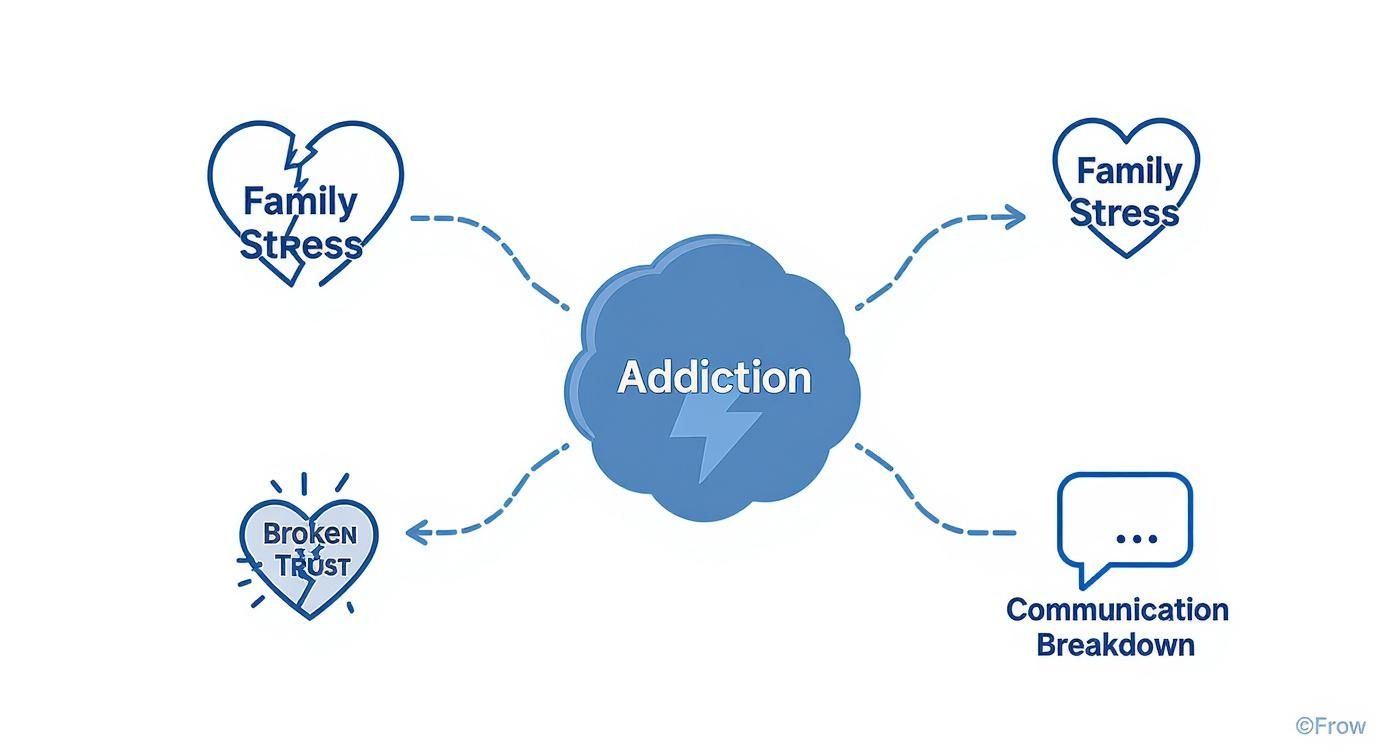
As you can see, addiction puts a direct strain on a family's trust, communication, and overall stability, creating fertile ground where these unhealthy roles can take root and grow.
The Hero: The Overachiever
The Hero is often the responsible child, frequently the oldest, who operates under the belief that if they can just be perfect enough, the family’s problems will somehow vanish. They pour all their energy into getting straight A's, excelling in sports, or climbing the career ladder, desperately hoping their achievements will bring a little pride and distraction to a home steeped in turmoil.
But this relentless pursuit of perfection comes at a steep personal price. Heroes often wrestle with crippling anxiety, a deep-seated fear of failure, and a complete inability to voice their own needs. They learn to bury their feelings under a mountain of accomplishments.
The Enabler: The Caretaker
The Enabler, also known as the Caretaker, is the person who tries to manage the addiction itself. They're the ones making excuses for their loved one's behavior, paying their overdue bills, or covering for them at work—anything to shield them from the natural consequences of their actions.
This role is almost always born from a place of deep love and a desperate desire to protect both the person and the family unit. To get to the heart of these coping roles, it's crucial to understand the underlying mechanics of breaking free from toxic relationship patterns, which addiction almost always makes worse.
The heartbreaking irony is that enabling strips away any motivation for the person to seek help. It effectively prolongs the cycle of addiction and prevents the entire family from beginning to heal.
The Scapegoat: The Problem Child
The Scapegoat is the family member who acts out, pulling all the negative attention away from the person struggling with addiction. Their rebellious behavior—getting into trouble at school, facing legal issues, or maintaining a confrontational attitude—becomes the family's "new" crisis to solve.
While they may appear defiant on the surface, the Scapegoat is often a sponge, absorbing the family's unspoken tension, anger, and pain. By taking the blame, they offer a convenient distraction from the much bigger, scarier issue of addiction.
The Lost Child: The Quiet One
The Lost Child copes with the chaos by becoming invisible. They learn to avoid conflict at all costs, retreating into a quiet, solitary world of books, video games, or their own imagination. They figure out early on that the safest way to navigate the family's emotional minefield is to simply stay out of the way.
Down the road, these individuals often grapple with profound loneliness, social anxiety, and immense difficulty forming close, meaningful relationships. Their needs go completely unnoticed because they’ve learned never to ask for anything.
Identifying Common Roles in Families with Addiction
Recognizing these roles isn’t about placing blame. It’s about understanding the function each role serves in a system under extreme stress. The table below summarizes these common archetypes.
| Family Role | Primary Motivation | Common Behaviors | Unintended Consequence |
|---|---|---|---|
| The Hero | To bring worth and pride to the family | Overachieving, seeking perfection, denying personal needs | Develops anxiety, burnout, and an inability to be vulnerable. |
| The Enabler | To protect the person and the family | Making excuses, covering up, minimizing consequences | Prevents the person from seeking help, prolonging the addiction. |
| The Scapegoat | To distract from the core problem | Acting out, rebelliousness, drawing negative attention | Carries the family's shame and anger, often struggles long-term. |
| The Lost Child | To avoid conflict and stay safe | Withdrawing, being quiet, seeking solitude, avoiding emotional risk | Becomes isolated, struggles with intimacy and self-worth. |
Seeing these patterns clearly is a huge first step. It allows you to view these behaviors not as personal failures but as learned responses to an impossible situation. With this new understanding, you can start the difficult but necessary work of dismantling these roles and learning healthier ways to relate to one another.
A critical part of this healing process involves creating new, healthier rules for engagement. Learning how to start setting boundaries in recovery is a non-negotiable step that can provide a practical framework for moving forward.
Understanding the Impact on Children
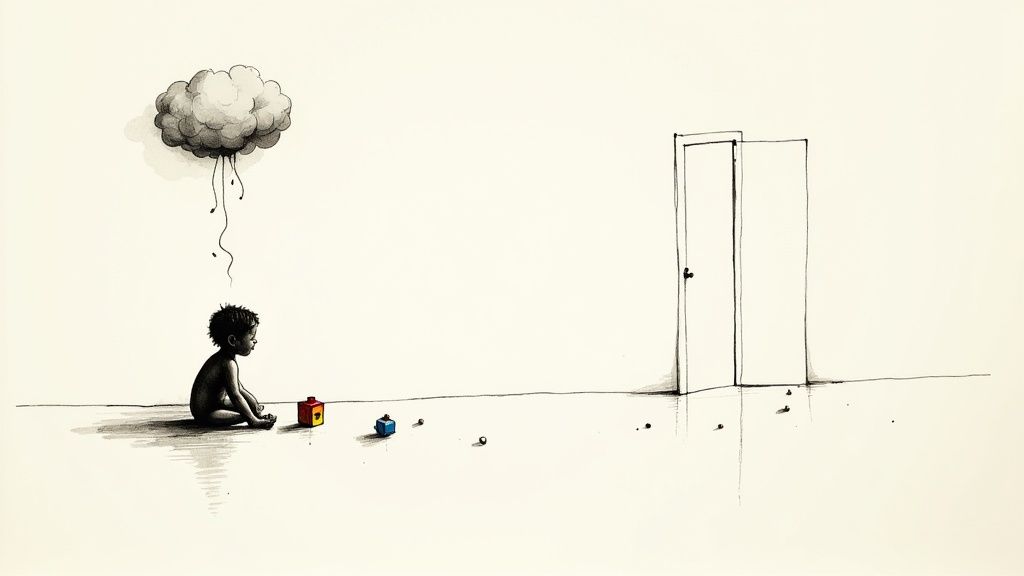
When a parent is caught in the grip of addiction, the entire home can feel like it’s built on shifting sand. For a child, this unpredictable world chips away at the very bedrock of a healthy childhood: safety and consistency. Their home, which should be a sanctuary, often becomes a source of constant anxiety and confusion.
This isn’t a rare problem unfolding in just a few homes. The scale is staggering. In 2023, nearly 19 million children in the U.S. were living with a parent or caregiver struggling with a substance use disorder. That’s roughly one in four kids trying to navigate this chaotic reality every single day, a number that throws the deep connection between families and addiction into sharp relief. You can learn more about the findings on parental substance use from the National Institutes of Health.
In this environment, children learn to become hyper-vigilant. They are constantly reading the mood of the home, trying to guess what might happen next. All their emotional energy is poured into managing the chaos, leaving very little room for the simple joys and developmental milestones of just being a kid.
The Emotional and Developmental Consequences
Living in the shadow of a parent's addiction can inflict deep, though often invisible, wounds. It's common for children to internalize the family’s stress, mistakenly blaming themselves for problems far beyond their control. This misplaced guilt can show up in countless ways, shaping their emotional and psychological growth for years to come.
Some of the most common long-term effects include:
- Elevated Risk for Mental Health Issues: The nonstop stress and trauma can lead to higher rates of anxiety, depression, and other mental health conditions down the road.
- Difficulty with Trust and Relationships: Growing up surrounded by broken promises makes it incredibly difficult to form secure, trusting bonds with others in adulthood.
- Increased Likelihood of Future Substance Use: Children of parents with SUD are at a significantly higher risk of developing their own substance use issues, thanks to a combination of genetic and environmental factors.
- Behavioral Problems: Some children act out, which is often a cry for help or a way to cope. Others might become overly compliant and withdrawn, learning to make themselves small to avoid trouble.
The constant exposure to a parent's struggles is a form of childhood trauma. It teaches a child that the world is unreliable and that their needs will always come second to the demands of the addiction.
Fostering Resilience and Breaking the Cycle
Despite these heavy challenges, children possess an incredible capacity for resilience. Healing can begin the moment families start creating an environment of honesty and support. Simply acknowledging the problem and giving a child a safe space to talk about their feelings is a powerful first step.
Of course, healing these deep-seated wounds often requires professional guidance. Understanding how these early experiences connect to later difficulties is a key part of what is trauma-informed therapy, an approach that focuses on creating safety and empowering individuals who have lived through traumatic events.
With the right support systems, open communication, and therapeutic intervention, it is entirely possible to interrupt the intergenerational cycle of addiction. Families can help their children move beyond just surviving and give them the tools to truly thrive.
How to Support Without Enabling
When you're dealing with families and addiction, it feels like you're walking a tightrope every single day. On one side, you have that fierce, protective instinct to help the person you love. On the other, there's the terrifying risk that your help is actually making things worse. Learning to tell the difference between genuine support and enabling is one of the hardest—and most important—skills a family can master.
Enabling isn’t born from bad intentions. It’s a reaction fueled by fear, love, and a desperate need to avoid a fight or see your loved one in immediate pain.
Think of enabling as slapping a bandage on a deep wound that really needs stitches. It might stop the bleeding for a minute, but it does absolutely nothing to help the real injury heal. In fact, it often makes it worse.
This kind of behavior shields the person from the natural consequences of their addiction. When you call their boss to say they're "sick" after a binge, or you pay their rent because they spent their money on substances, you're removing the very wake-up calls that might finally push them to get help.
Shifting from Enabling to Empowering
True, healthy support looks and feels completely different. While enabling is a short-term fix to quiet your own anxiety, real support is a long-term strategy that empowers your loved one to recover. It's about encouraging responsibility and self-respect, not trying to control the outcome.
The main difference comes down to the focus of your actions.
- Enabling Actions: These are attempts to manage or control the addiction itself.
- Supporting Actions: These focus on helping the person, not the illness.
True support means loving someone enough to let them feel the full weight of their choices. It’s about offering a hand up, not a handout that keeps them stuck right where they are.
Practical Steps for Healthy Support
Making this shift is a conscious choice, and it starts with setting clear, firm, and loving boundaries. Boundaries aren't punishments. They're simply your rules of engagement—designed to protect your own well-being and clarify what you will and will not do.
Here are a few concrete ways to start practicing healthy support:
- Stop Making Excuses: Let them be accountable for their own actions. That might mean facing their employer, their friends, or even legal consequences. It's their reality to face, not yours to fix.
- Cease Financial Bailouts: Refuse to pay for bills, debts, or legal fees that are a direct result of their substance use. This is critical for helping them connect their choices with real-world outcomes.
- Offer Help That Fosters Recovery: Instead of handing over cash, reframe your offer. You could say, "I can't give you money, but I'm willing to drive you to a support group meeting," or "I will sit with you and help you research treatment centers."
- Communicate Your Concerns with "I" Statements: Talk about how their behavior affects you without casting blame. Saying, "I feel scared and worried when I see you intoxicated" lands very differently than, "You're always causing problems."
This transition is tough. It’s often loaded with guilt and fear. But by stepping back from enabling, you create the space your loved one needs to finally see the true cost of their addiction. And that hard truth is often the first, most vital step toward choosing a different path.
Using Family Therapy to Heal Together
When addiction shatters family trust, just trying to talk things out rarely works. The communication lines are frayed, and old wounds get in the way. This is where getting a professional involved can make all the difference.
For many families, dedicated family therapy becomes the cornerstone of their healing journey. It’s a structured process designed to rebuild what was broken, teach new skills, and help the entire family system get healthy again.
It's easy to think family therapy is about pointing fingers or deciding who was "right" and who was "wrong." But its real purpose is the exact opposite. A skilled therapist acts as a neutral guide, creating a safe space where everyone can finally share how they feel without triggering an argument.
The focus is on moving forward, not getting stuck in the past. It’s about untangling the complicated knots that families and addiction create, helping everyone see how their own behaviors and reactions played a part.
What to Expect in a Session
In a typical session, a therapist helps the family spot the unhealthy roles and dynamics that have become second nature. A big part of the work is practicing new, healthier ways of communicating right there in the room, with the therapist guiding the conversation.
This process helps to:
- Establish Healthy Boundaries: Family members learn how to set limits and interact in ways that promote mutual respect and well-being.
- Rebuild Broken Trust: Guided, honest conversations create a path to slowly mend the deep wounds left by deception and broken promises.
- Improve Communication Skills: Families learn to stop blaming and start listening, using new tools that build understanding instead of conflict.
Family therapy isn't just for the person in recovery; it's for every single person impacted by the addiction. It recognizes that everyone has been hurt and everyone needs a chance to heal.
Common Therapeutic Approaches
Therapists often use evidence-based models to guide this healing process. One popular approach is Multi-Dimensional Family Therapy (MDFT), which looks at the problem from all angles—the individual, the family unit, and even outside influences like school or work. This comprehensive method gives every family member better tools to cope.
While one-on-one counseling is absolutely vital, bringing the family into the picture addresses the environment that can either support or undermine long-term recovery. You can see how these different formats work by comparing individual therapy vs. group therapy and understanding their unique roles.
Ultimately, showing up for therapy together is a brave and powerful step. It's a commitment to breaking old patterns and building a new, healthier future on a foundation of honesty and support.
Your Guide to Self-Care and Healing
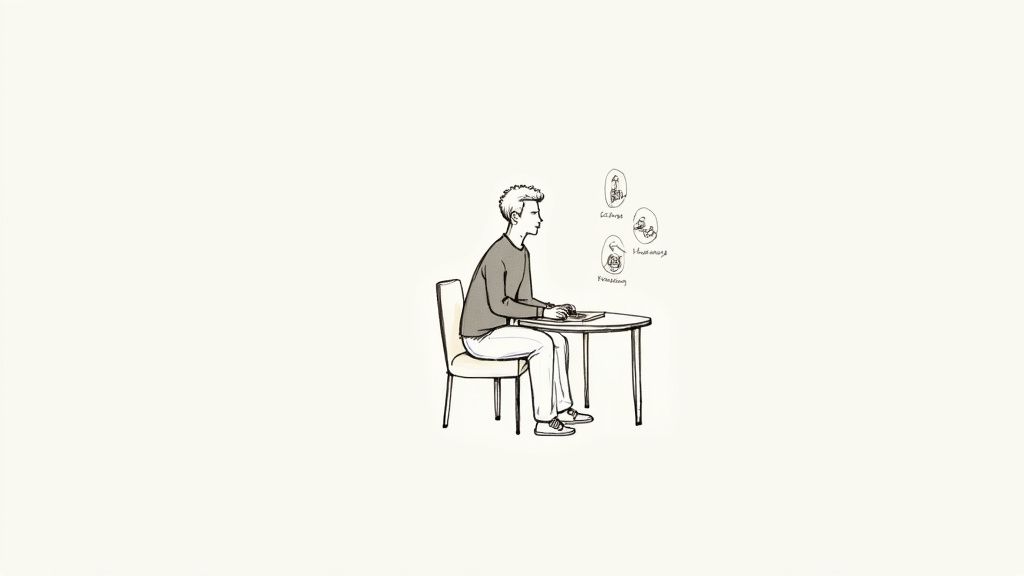
When you're dealing with a loved one’s addiction, it’s all too easy to pour every ounce of your energy into managing the crisis. You become the first responder, the detective, and the emotional support system—often with nothing left for yourself. But as the old saying goes, you cannot pour from an empty cup.
Prioritizing your own well-being isn't selfish. It's a non-negotiable survival strategy and a critical piece of a healthy family recovery. When you neglect your own mental and emotional health, you're on a fast track to burnout, anxiety, and depression. And from that place, it’s impossible to offer the stable, clear-headed support your family desperately needs.
In fact, healing yourself is one of the most powerful things you can do to create an environment where recovery can actually take root for everyone.
Reclaiming Your Well-Being
It’s time to take intentional steps to care for yourself. This is your permission slip to shift the focus back to your own healing, even if it feels uncomfortable at first. Re-engaging with your own life is a powerful act of defiance against the chaos addiction tries to create.
Here are a few concrete ways to start:
- Seek Your Own Support: You are not alone in this. Groups like Al-Anon or Nar-Anon offer a safe space to share your experiences with people who genuinely understand the impossibly complex feelings of loving someone with an addiction.
- Rediscover Your Hobbies: Make a conscious effort to reconnect with activities that brought you joy before the addiction took center stage. Whether it's reading a book in peace, gardening, or hiking, these outlets are vital for your mental health.
- Establish Firm Boundaries: You have to protect your peace by setting and maintaining clear boundaries. This might mean limiting conversations about the addiction or simply refusing to get pulled into crisis-driven drama.
Self-care is not an indulgence; it's the foundational work required to rebuild your strength. It's about ensuring that when your loved one is ready for recovery, you are healthy enough to be a constructive part of their support system.
Remember, your healing journey runs parallel to your loved one’s. Both are essential for the long-term health of the entire family. By taking care of yourself, you model what healthy coping looks like and begin to reclaim your own life from the shadows of addiction.
Common Questions About Families and Addiction
When addiction hits home, it brings a storm of confusing, painful questions. You're not alone in feeling lost. Here, we tackle some of the most urgent concerns families face with direct, compassionate answers drawn from years of experience helping people heal.
Can I Force My Loved One into Treatment?
This is one of the first questions families ask, usually out of sheer desperation. While legal options to force an adult into rehab are complicated and vary by state, the practical answer is that forcing someone rarely works. Lasting recovery has to be chosen.
A more effective path is to create a crisis that makes the consequences of addiction impossible to ignore. This can be done through a professionally guided intervention or by setting firm boundaries where you stop shielding them from the fallout. When the pain of using becomes greater than the fear of quitting, they are far more likely to choose help for themselves—and that choice is the bedrock of real change.
How Do I Talk to My Children About a Parent's Addiction?
Be honest, keep it age-appropriate, and stay consistent. For younger kids, simple is better: “Daddy has a grown-up sickness that makes him act differently sometimes, but it’s never, ever your fault.” With teenagers, you can be more direct about the disease of addiction.
The most critical message to give any child is the "Three Cs": they didn't Cause it, they can't Control it, and they can't Cure it. Your main job is to create a safe space where they can ask hard questions without feeling judged.
What if My Loved One Relapses After Treatment?
First, take a deep breath. Relapse is a common part of the recovery journey for many people; it's a setback, not a sign that treatment failed or that all hope is lost. The absolute worst thing you can do is panic and slide back into old enabling habits.
Instead, view the relapse as a signal that the recovery plan needs a tune-up. Encourage them to be brutally honest with their therapist or support group right away. For the rest of the family, this is the time to lovingly reinforce your boundaries and get support for yourselves to work through the fear and disappointment.
At Altura Recovery, we know that addiction is a family disease, which means recovery has to be a family mission. Our family workshops and proven therapies are built to help everyone heal, together. If you're ready to rebuild, learn more about our addiction treatment programs.

